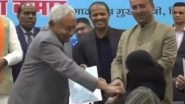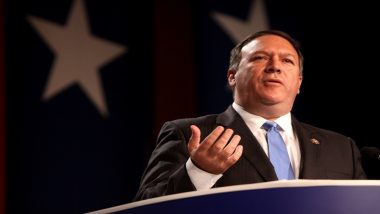The United States and China will hold high-level talks in Beijing on Monday to stem the downward spiral of bilateral relations between the world’s biggest economies.
U.S. Secretary of State Mike Pompeo is scheduled to hold talks with top Chinese leaders and officials in a bid to halt the ongoing trade war in which both countries have slapped tariffs on billions of dollars of their bilateral exports.
Announcing Pompeo's visit, China's Foreign Ministry spokesperson Hua Chunying last week said that China and the U.S. would exchange views on bilateral ties and regional and international issues of common concern.
U.S. Defence Secretary Jim Mattis too was due to visit Beijing but the visit was cancelled. The news of cancellation of his visit came after U.S. accused a Chinese naval warship of unsafe and aggressive maneuvering near its destroyer USS Decatur when it passed close to the contested islands off the disputed South China Sea to assert freedom of navigation.
China claims almost all of the South China Sea. Neighbouring countries of Vietnam, Philippines, Malaysia, Brunei and Taiwan have counter claims.
Pompeo's visit was expected to provide an opportunity to both sides to lower the tensions between them. Besides slapping additional tariffs on Chinese exports, U.S. has also imposed sanctions on a Chinese military unit for securing Russian weapon systems like S-400 missiles and Su-35 fighters.
Ahead of the visit both countries had heated exchanges with regards to their internal affairs. U.S. Vice President Mike Pence on Thursday accused China of interfering in U.S. internal affairs and elections policies.
Pence said China wants a "different American President" and is using more "proactive and coercive" methods to interfere in America's domestic policies and politics.
China has refuted Pence's allegation terming them as "malicious slander". Reacting to Pence's allegations, Hua on Friday said, "The relevant speech made unwarranted accusations against China's domestic and foreign policies and slandered China by claiming that China meddles in U.S. internal affairs and elections".
Significantly ahead of Pompeo's visit, Chinese Ambassador to Washington Cui Tiankai said China wants to end the trade war, but that the U.S. position keeps changing "so we don't know exactly what the U.S. would want as priorities".
"We are ready to make a deal. We are ready to make some compromise, but it needs the goodwill from both sides," Cui said in an interview on Wednesday with America's National Public Radio, official Chinese media reported on Friday.
"We offered to reduce the trade deficit of the U.S. for instance. And we also presented a very good proposal to the U.S. side about the further reform and opening up in China, some of the so-called structural issues," he said.
"We are ready to work on the issues. Then I think more than once we had some tentative agreement between the two working teams. Then just overnight the tentative agreement was rejected and the demand from US changed. So this is very confusing, and this is making things very difficult," he said.













 Quickly
Quickly












